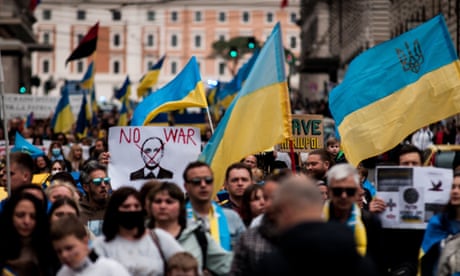- by foxnews
- 08 Apr 2025
‘Their absence will be felt’: loss of Russian visitors and imports hits Italy’s economy
‘Their absence will be felt’: loss of Russian visitors and imports hits Italy’s economy
- by theguardian
- 08 Apr 2022
- in news

In the window of a tobacco shop in the eastern Tuscan town of Arezzo is a yellow sign with red letters reading "We only accept payment in roubles".
"It's just a provocation," said Anthony Brucato, the shop owner, noting that the same window displayed the blue and yellow flag of Ukraine and a drawing of a dove with a peace flag in its beak. "I want to make people talk about what's happening. There are a few leaders making decisions that have an impact on millions. This is crazy."
While Brucato said he was critical of Russia's invasion of its southern neighbour, he admits his shop window could be seen as showing a mixed message. It's not alone.
Italy's government stands squarely with other EU nations in opposing Russia's war in Ukraine. Italy has imposed sanctions on the Russian economy, stopped dealing with its banks, and called for a negotiated settlement to the conflict.
Opinion polls show that between 80 and 90% of Italians support the government's stance, according to the polling firm Opinioni, a number that could tick higher as evidence of Russian atrocities in the Ukrainian city of Bucha come to light.
Yet the country continues to rely heavily on the import of Russian gas, though the Italian prime minister, Mario Draghi, flatly refused demands to pay for that gas in roubles - a move in a geopolitical chess game that inspired Brucato's yellow sign.
Analysts say the absence of Russian imports of Italian goods and of Russian visitors may threaten to derail Italy's fragile post-pandemic economic recovery. In late March, the Economist Intelligence Unit reduced its economic growth estimates all across the EU but said Italy would be hit the hardest, with growth slowing to 3.4% this year from a previous estimate of 4.4% because of the hit to trade with Russia and secondary impacts such as rising fuel costs and supply chain issues. That was in line with Italy's National Statistics Institute saying last week that further downward adjustments could be in the works if the war continued.
Producers of luxury goods including clothing, jewellery and accessories said they were expecting similar downturns in exports. Forte dei Marmi, a coastal resort that caters to Russian buyers and visitors, reportedly put expansion plans on hold days after the start of the war.
Italy's tourism sector, already reeling from lockdowns and quarantines over the past two years, will be hit even harder, according to Michele Costabile, a professor of business and management at Luiss University in Rome. He noted that while Russians barely cracked the top 20 for numbers of visitors to Italy, in terms of time spent in the country they were ninth, and when measured by overall economic impact they were second, behind only Germany.
"Traditionally the average Russian visitor stayed in Italy for five or more days, compared to two or three from most other countries, and they spent around 65% more money per day than the average tourist," Costabile said. "I assure you, the absence of Russian visitors in the sector will be felt."
Marc Antonio Esposito, a clerk in a high-end watch store in Rome, said the impacts of the war had been obvious from the start.
- by foxnews
- descember 09, 2016
Ancient settlement reveals remains of 1,800-year-old dog, baffling experts: 'Preserved quite well'
Archaeologists have recently unearthed the remarkably well-preserved remains of a dog from ancient Rome, shedding light on the widespread practice of ritual sacrifice in antiquity.
read more


